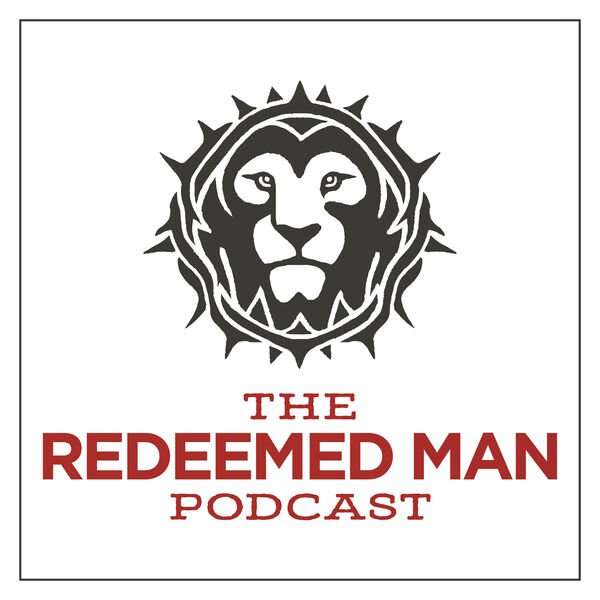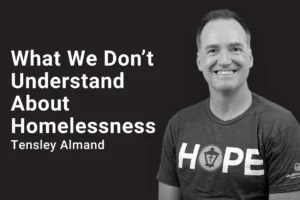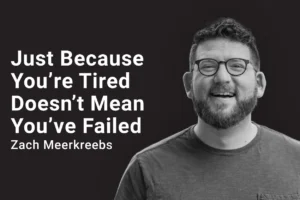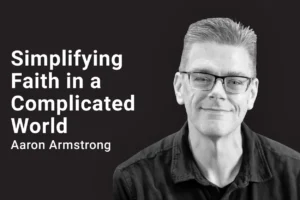Freedom Restored

Strategic Fathering Ministries is a Partner of The Redeemed
More About The Podcast
- About
- Show Notes
About The Podcast
This month’s speaker is Jay Cookingham, founder of Strategic Fathering Ministries, which encourages men to embrace God’s call to aid and mentor other people in need. It’s those kinds of people, “strategically placed” in his life, whom Cookingham says helped him find God and strengthen his faith after years of horrific abuse from his father. “God gave me other men in my life to help me deal with the issues of manhood,” he explains. “So I think it’s very strategic of Father God to have a plan for each one of us as a son or a daughter of God and to orchestrate that walk, that path, that journey, to bring us closer to His own heart.”
Show Notes
Welcome and Guest Introduction
My name is Paul Amos and I’m the founder of The Redeemed. The Redeemed is a community built for men to come together of all types and backgrounds to discuss their trials and tribulations in life and their triumphs over them. Today we are blessed to have a wonderful guest, named Jay Cookingham, who has come to us from Strategic Father Ministries, and we’d like to welcome him to the show.
What Does Redemption Mean to You?
Paul: What does redemption mean for you?
Jay: First of all, thank you for having me on your program, and I really appreciate it. Super honored.
Redemption is really the greatest rescue mission ever put into action. Obviously, redemption means salvation to me, but forgiveness of sin, it’s more than that. Jesus rescued me, not just from my sin, but He redeemed my whole life, my spirit, my mind, my body, my abilities, my talents.
So redemption to me means new life. The life that I was meant to live before sin entered into my life. Redemption is that I am saved to become somebody and that’s to be the person that Christ intended me to be. Redemption is huge to me.
Paul: Same to me, honestly, the whole premise around The Redeemed was the fact that so many men don’t understand that God has redeemed them ahead. As it says in Isaiah, we know that God has come ahead of us, He’s already made the choice for us to be redeemed and to give us that path. So thank you for sharing that.
Let’s move and shift a little bit towards you, you have a very powerful testimony that I’ve had the opportunity to get to hear and read about. I’d love hearing, if you wouldn’t mind sharing, a little bit with our audience about your background and what brought you to the place you’re in.
Jay Cookingham’s Personal Testimony
Jay: I grew up in a very abusive home. My father was physically abusive. He was very verbally abusive. Every word that came out was either a swear word or some kind of curse or some kind of put down. Verbal abuse was awful. He also sexually abused me for over 10 years.
So there was the beating, the sexual abuse, and the verbal abuse. The verbal abuse I actually think was the worst, because it was the most lasting. It stays in your mind, the horrible things he said about me.
That’s whatI grew up in. We moved from one small town to another small town; the small town that I now live in. We moved in next door to a Christian family. They invited me to a church for a kids crusade, like a VBS. To my surprise my father let me go. That was really in itself a miracle. It was the first time that I heard about Jesus Christ. Up to that point, I just thought Jesus Christ was another swear word. I didn’t know it was a person.
They kept talking about this man who loved me. This was the first time I had ever entered a church. There was music and people smiling, the lights were bright and people were friendly. It was really a culture shock.
I listened intently to the message about this man named Jesus who would love me enough to die for me. Now at seven years old, that didn’t compute, but the love thing really got to me. They kept saying that ‘You’re going to get an opportunity to be Jesus tonight’. So while they were standing up on the platform, there were three doors behind them, and I thought for sure that this person Jesus was going to come out in one of those three doors. That’s how real they made it seem.
They when they said, ‘Would you like to come down and meet Jesus?’ I was there! I was all over as a seven-year-old. Even though I didn’t understand the concept of sin and all that kind of stuff, all I was responding to was that a man actually loved me enough to do something really important for me. I accepted Jesus that night.
I would like to tell you that all of my problems disappeared, but actually the abuse got worse. So much so that at around 12 years old, I started running away from God. I started getting involved in drugs and drinking and rebelling. I still believe in God, but I did everything in my power to hurt God. I thought I was going to hurt him back. That this was His fault. I was blaming God all over place.
When I got to be 17 years old, I went into the woods to commit suicide. The one and only gift I ever got from my father was hunting knife. And I brought that out into woods, and I was going to slit my wrist. As I was beginning to slit my wrist, I’ve really heard God say ‘Stop. Stop.’
I dropped at knife and I looked around. There was no one there. It unnerved me enough to call that whole thing off, and I went back home. There was just this death wish that I had. I try to kill myself by drinking, and it really came to a point where I was so drunk one night that my friends through me on a bunk in a cabin in the wood. I felt in the life just kind of leave my body. My feet got cold, my legs got cold, my waist got cold, and then it got to my chest and I really felt God say ‘Jay is just the way you want it to end?’ And I said, No.
I fell asleep. Next morning, I woke up. It was the first time I woke up without a hangover. It happened to be a Sunday and I had not been to church in a very long time. I went to my neighbors and said, ‘Hey, can I come to church with you?’ They said, ‘Of course.’ Hollywood can’t script it better than this, but the sermon that day was about the prodigal son. And that’s when I finally came back to God. That’s where the redemption process started to again in my life.
So that’s a quick synopsis of what happened, but God delivered me from some really dark places in my life.
Timestamp: 07:51
Paul: First of all, thank you for sharing that powerful story. There was so much trauma happening in your younger years.
Q: As a seven-year-old, before you started to turn to things that, as you said, that were negative choices, how did you cope as a young man with all that was going on in your life during those years?
Jay: I still believe in God. I still read the Bible. I had this old Bible where I just kept on writing scriptures all around the box that it came in. I would hold on to this thing and read the scriptures over and over again.
But I got so mad at God during this time, because I felt like these prayers weren’t being answered, and there was so much trauma and pain from my father. The physical abuse and the name calling for years. So unfortunately, the coping was the drugs and the drinking and trying to make the pain go away. But it never did. I would just always feel worse when the high wore off.
When I came back to Jesus, I was going to a local college at that time, and I was back to trying to live my life for Christ. And I came home from school one afternoon and my father used to like to ambush me, and as soon as I walk in the door started hitting me and pounding on me and stuff like that. That’s what happened this day I was not ready for it. I was now old enough and strong enough to stop him from hitting me. And I did, I stopped him, I didn’t hit back, but I stopped him from hitting me.
And I just walked upstairs to my bedroom and he followed me upstairs and this moment was really crucial. This was really the moment that I really began to really deal with this anger and pain. He would follow me upstairs and he was calling me every name in the book, which was not unusual and didn’t bother me. But then he crossed the line and he suggested that I was doing something sexual with my mom. And I lost it.
He was just a couple of steps below me, and I turned to hit him as hard as I could. It was my intention to knock him down the stairs and hopefully break his neck.
God can do things really fast. As I was turning to punch my dad, my fist changed into a pointer finger and landing on his nose and I said, ‘Dad, I love you, and God forgives you.’
My father was like wide-eyed because he saw the fist coming and then this happened. It made him silent. He stopped walking, stopped, cursing, and he just turned around and walked down the stairs.
As I went to my room, I went to the Father and asked ‘What happened?’ And He said, ‘Well, you needed to forgive your father, and I just gave you the opportunity to do so.’ That was the start of really dealing with those issues. Up to that time, I just kind of pushed them aside, I said, Okay. It was awful, but I’ll just forget all of that. It was just boiling up in me. God told me that I had to forgive my father in order for my restoration to really start to happen. For me to be free for these years of abuse.
Forgiveness was the key for me. Forgiving my dad was really the first step that I took in my personal freedom. For me to really start walking in a redeemed way, I had to forgive my father.
Timestamp: 12:20
Paul: Wow, that is a powerful story to go so quickly from extreme rage into love. That moment obviously had a profound impact on your future and allowed you to begin the process of forgiveness. For so many of our people that are listening or watching the webcast here today, they struggle to come out from underneath the trauma that they feel. That epiphany moment that you had is not something they necessarily deal with. I’m sure in your ministry, you see this all the time.
Q: How do you help guide people to have a moment like you had and begin to heal rather than continuing to hold on to that pain?
Jay: Obviously, there was a lot of work. Although I made a decision to forgive my dad, there still was a huge process, understanding what that meant. What I try to get other people to understand is that forgiveness doesn’t excuse the wrong that was done to you. Me forgiving my dad didn’t excuse what he did. Forgiveness was getting me out of prison. I was saying to my father that you no longer have control over how I feel. I forgive you. You don’t control my thoughts anymore. You don’t control my emotions.
Forgiveness gets the person out of prison, and then you can start to work on the stuff that got you into that place. So I like to tell people, it’s not saying that we overlook what they’ve done, it just says that you look on it in a new perspective. You look at it like the Father looks at us, we’ve been forgiven. We were forgiven while we were still sinners.
Forgiveness is basically saying, ‘I want to get out of this prison. I don’t want these events from this person to have control of my life anymore. So I’m going to choose to forgive, and then God’s going to help me work out what I need to have worked out.’
Timestamp: 17:21
Paul: I’m so sorry to hear that reconciliation never occurred. I like your delineation there between forgiveness and reconciliation, that’s a great one to remember.
Q: For so many people, when their earthly father abuses them, hurts them, harms them, creates any form of trauma, much less to the magnitude that you’re created, the trust for the Heavenly Father is in many cases, not there. How did you so easily switch over to a love for Jesus and a love for God? What struggles, if any, did you go through trying to trust the Father?
Jay: It was an active and open rebellion. It wasn’t just that I got involved with drinking or drugs and it lead me down a dark path. No, I chose that. I believed in Him. So I believed, ‘You’ve hurt me, so I’m going to hurt you.’ The abuse of my earthly father gave me these lenses to look through towards the Heavenly Father and it distorted my view of God for about four years of my life. I saw my Heavenly Father as kind of like my dad. It was really distorted.
Forgiveness gives you a perspective. It gives you a perspective of yourself and gives you perspective of the life around you. And it started to help me see Father God in a different way.
Father God was so kind. I started to notice older men in my life, at strategic times in my life, to speak life into me. I began to see the vision change. These men were Godly men, showing me a way of how to be a man and how to have an active ongoing relationship with Jesus. These men showed me how to do it, not by sitting me down and give me a Bible study, but living it in front of me and living it with me.
One of them was the neighbors, that first brought me to church. He was one of my saviors in a sense of making sure that I knew that Jesus wasn’t like my father was. I was blessed to have older men come into my life and mentor me along the way.
Strategic Fathering Ministries
Timestamp: 20:49
Paul: Maybe I pivot here for a minute and talk a little bit about Strategic Fathering Ministries. Tell me a little bit about the formation of your ministry, and what the key message that you’re trying to deliver.
Jay: I had started an earlier ministry in my church called Dads: Daring And Dedicated Servants. We had a ministry to our local Children’s Home, where we would take kids on gatherings and invite them into our homes. The administration of that place changed and so that ministry kind of ended. But I still felt this sense of fatherlessness in the people around me and in the places I was going, even places like men’s breakfasts and such. I wanted to answer that best I could. I had just become a father myself, and so Strategic Fathering Ministries was kind of born.
The message I really wanted to do get across from Strategic Fathering Ministries is that God has a strategic plan to rescue our hearts. That is sonship. I believe sonship is God’s greatest Rescue Mission, because it brings salvation, it brings redemption, it brings everything that we’re supposed to be and helps us conformance image of Christ.
The message I want to get out is that being a father is not just about having biological children, it is realize that if you’re a male, if you’re a dad, if you’re a grandfather, if you’re alive and breathing, you’re called to Father. It’s more than just raising kids, it’s raising spiritual sons and daughters and getting them to see who Father God is and all His glory and majesty. I want Strategic Fathering to was to point people to Father God like I discovered Him and worked through all those difficult things that we have because our earthy fathers.
Paul: If I’m understanding you correctly, you’re talking to every human being about being a father. Maybe you can talk for just a minute about those people who have not had the blessing of having their own children or have not had the blessing of adoption or in any way being a father or parent. Talk about what it means for them and what their role is to be a father.
Jay: There are so many opportunities to be a father figure. There’s coaches, there’s teachers, there’s pastors. My role as pastor is really to be like a spiritual father. One of the main things about a pastor is that we’re supposed to equip the people that we serve.
The Greek word for equip means to get a vessel ready to take a voyage. To get it ready with provisions, with a crew, with maps and guidance. That’s what fathers do, they equip people. They equip sons and daughters to be able to take the voyage that God has for them.
I had a couple of coaches in baseball, I’m telling you, they were lifesavers. I had a couple of Sunday school teachers that spoke life into me. I had different mentors along the way that they didn’t have kids with their own, but they listened to the call of God in their life and were able to say I still have a responsibility. Jesus didn’t have any kids. He talked about his Father God all the time. If you’re a biological dad, you’ve been given this wonderful gift, you get to disciple people in your own home, but that shouldn’t keep you from being a father figure to someone else, to be a mentor or coach, a teacher.
Timestamp: 26:14
Paul: Q: How do you teach men how to be a father? For some people, it’s natural. For others, not so much. Within your ministry, how do you impact men and really teach them to be a father?
Jay: First of all, I try to see if there’s a father or mother wound. Sometimes our parents are not perfect, and sometimes they’re really good parents. So I try to get men to see who the Father really is and who they are in Christ. Because purpose and identity are huge. Sonship speaks into men, speaks identity and purpose into them.
Then I try to get them to identify their core strengths or their abilities or their talents. Some guys don’t really know what they’re good at, maybe they’re really good at financial stuff, maybe they’re really good about taking an engine apart, maybe they know how to hunt. These are the areas that you could really disciple people through. There are kids that love to work with engins or love to go hunt. If we can find out our God-given talents, we can learn how to father through that. All fathering is doing is coming along someone and helping them get to the next step, the next place in their development as a human being.
It’s more than raising kids, it’s raising sons and daughters to see who Father God is and then releasing them in their gifting. Training someone how to be a father is really just training them how to love people and how to help them see how their abilities can be used to bless other people and teach them. And then when you’re teaching them a particular skill set, maybe you’re talking to them about Jesus, you’re talking to them about how God has invested in them, and not just for salvation, but for a life.
Paul: You’ve proven it, not just in your ministry, but by having seven kids of your own.
Jay: Yeah, they have taught me more about God than any other person on the planet.
Paul: Well, Jay, and has been an absolute pleasure to have an opportunity to talk to you today. I so thank you for coming on the show and having a chance to share your testimony and tell us about Strategic Fathering Ministries. I want to thank our audience today for listening and let you know that we will continue you on a monthly basis to put out our webcast from a third Thursday of each month.
Search Podcasts
Enjoyed This Episode?
Discover more inspiring episodes of The Redeemed Man Podcast wherever you tune in!
Share This Podcast
Sign up for updates
When you sign up for this mailing list, you’ll receive regular updates for The Redeemed.
More From The Redeemed Man Podcast

What We Don’t Understand About Homelessness
Tensley Almand, president and CEO of Atlanta Mission, shares his perspective on the unhoused community and how we can better understand the problems faced by those in poverty.

Just Because You’re Tired Doesn’t Mean You’ve Failed
Pastor and author Zach Meerkreebs relates his experiences at a once-in-a-lifetime spontaneous revival and how they shaped his perspective on masculinity, transparency, and humility.

Simplifying Faith in a Complicated World
Ministry leader and author Aaron Armstrong talks about the bumps in the road he experienced early in his faith journey, and how he’s trying to help others navigate the same challenges.









